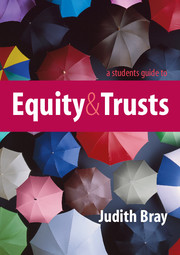Book contents
- Frontmatter
- Contents
- Preface
- 1 Historical introduction
- 2 Equitable remedies
- 3 The classification of trusts and powers
- 4 The three certainties
- 5 Constitution of trusts
- 6 Formalities for the creation of a trust
- 7 Private purpose trusts
- 8 Unincorporated associations
- 9 Resulting trusts
- 10 Constructive trusts
- 11 Trusts of the family home
- 12 Secret trusts and mutual wills
- 13 Charities; the Charities Act and the rules of cy près
- 14 Trustees: appointment, retirement and capacity
- 15 Duties and powers of trustees
- 16 Variation of trusts
- 17 Fiduciary duties and breach of fiduciary duties
- 18 Breach of trust and defences to breach of trust
- 19 Remedies against strangers to a trust
- 20 Tracing
- Index
9 - Resulting trusts
- Frontmatter
- Contents
- Preface
- 1 Historical introduction
- 2 Equitable remedies
- 3 The classification of trusts and powers
- 4 The three certainties
- 5 Constitution of trusts
- 6 Formalities for the creation of a trust
- 7 Private purpose trusts
- 8 Unincorporated associations
- 9 Resulting trusts
- 10 Constructive trusts
- 11 Trusts of the family home
- 12 Secret trusts and mutual wills
- 13 Charities; the Charities Act and the rules of cy près
- 14 Trustees: appointment, retirement and capacity
- 15 Duties and powers of trustees
- 16 Variation of trusts
- 17 Fiduciary duties and breach of fiduciary duties
- 18 Breach of trust and defences to breach of trust
- 19 Remedies against strangers to a trust
- 20 Tracing
- Index
Summary
Key points
a resulting trust is an implied trust;
resulting trusts are said to give effect to the implied intentions of the owner;
there are two types of resulting trusts: presumed and automatic;
a presumed resulting trust is based on the presumed intention of the transferor;
a presumed resulting trust arises where the purchase money is provided by A or A and B together for the purchase of property in B’s name;
a presumed resulting trust can be rebutted by evidence that either a gift was intended or because of other circumstances;
a presumed resulting trust could also be rebutted in some circumstances by the relationship of the parties but this principle has been abolished;
a presumed resulting trust can be rebutted by evidence of a loan; and
an automatic resulting trust arises where a trust fails or there is a surplus of funds after the purpose of the trust has been carried out.
Definition of a resulting trust
A resulting trust arises by operation of law and contrasts with an express trust which arises because the settlor has taken the proactive step of creating a trust. The trust arises informally without the need to satisfy formalities such as s.53(1) Law of Property Act 1925.
- Type
- Chapter
- Information
- A Student's Guide to Equity and Trusts , pp. 122 - 139Publisher: Cambridge University PressPrint publication year: 2012



